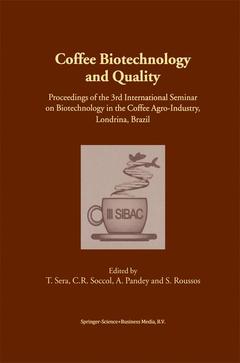Coffee Biotechnology and Quality, 2000 Proceedings of the 3rd International Seminar on Biotechnology in the Coffee Agro-Industry, Londrina, Brazil
Langue : Anglais
Coordonnateurs : Sera T., Soccol C.R., Pandey A., Roussos S.

Coffee Biotechnology and Quality is a comprehensive volume containing 45 specialised chapters by internationally recognised experts. The book aims to provide a guide for those wishing to learn about recent advances in coffee cultivation and post-harvest technology. It provides a quantitative and rational approach to the major areas of coffee research, including breeding and cloning, tissue culture and genetics, pest control, post-harvest technology and bioconversion of coffee industry residues into commercially valuable products. The chapters review recent experimental work, allowing a conceptual framework for future research to be identified and developed.
The book will be of interest to researchers and students involved in any area of coffee research. Consequently, plant breeders, microbiologists, biotechnologists and biochemical engineers will find the book to be a unique and invaluable guide.
The book will be of interest to researchers and students involved in any area of coffee research. Consequently, plant breeders, microbiologists, biotechnologists and biochemical engineers will find the book to be a unique and invaluable guide.
General.- 1. Biotechnology and the future of coffee production.- 2. Coffee cultivation in India.- Coffee breeding, tissue culture and genetics.- 3. Breeding and biotechnology of coffee.- 4. Development of coffee cultivars in reduced time by using biotechnology in the «IAPAR model for high density planting».- 5. Somatic embryogenesis of coffee.- 6. Biotechnology for genetic improvement of Indian coffee.- 7. Molecular breeding in coffee (Coffea arabica L.).- 8. Study of combining ability and heterosis in coffee.- 9. Microsatellites in Coffea arabica L..- 10. Standardization of encapsulation technique for producing synthetic seeds in coffee.- 11. Field testing of arabica bioreactor-derived plants.- 12. Interspecific protoplast fusion in Coffea.- 13. Biochemical and molecular studies of the main protein in the coffee endosperm.- 14. In vitro embryo culture of Coffea arabica: The influence of NAA and BAP.- 15. DNA markers for coffee tree breeding.- 16. Genetic polymorphism in species and hybrids of Coffea revealed by RAPD.- 17. Genetic fingerprinting of coffee leaf rust differentials with RAPD markers.- 18. Coffee (Coffea sp.) genetic transformation for insect resistance.- 19. Development of coffee trees resistant to leaf miner.- Pest control.- 20. The role of biological control in an integrated coffee borer management in Columbia.- 21. Correlation between edaphic factors and Coffea arabica fungal pathogens in South Pacific.- 22. Physiological studies on mycorrhizal fungi production.- 23. Characterization of Beauveria bassiana and Metarhizium anisopliae isolates for potential use against the coffee berry.- 24. The nematophagous fungi helper bacteria (NHB): a new dimension for the biological control of root knot nematodes by trapping fungi.- 25. Use of solid statefermentation to produce spores of fungal biopesticides for insect control.- 26. Amylase and protease inhibitors as alternative against insect herbivores.- 27. Properties of amylases of coffee berries borer, Hypothenemus hampei (Ferrari) (Coleoptera: Scolytidae).- 28. New developments in the mass production of parasitoids Chephalonomia stephanoderis(Hymenoptera: Bethytlidae) on Hypothenemus hampei (Coleoptera: Scolytidae) reared using artificial diet.- Post-harvest technology.- 29. Production cost of hybrid seeds of coffee obtained manually.- 30. Electric conductivity of exudates of green coffee and its relationship with the quality of the beverage.- 31. Recent developments in Brazilian coffee quality: new processing systems, beverage characteristics and consumer preferences.- 32. Organoleptic properties of espresso coffee as influenced by coffee botanical variety.- 33. Mycotoxigenesis in grains-Application to mycotoxic prevention in coffee.- 34. Species related differences in Brazilian green coffee contaminated by ochratoxin A.- Coffee residues biotechnology.- 35. Development of bioprocesses for the conservation, detoxification and value-addition of coffee pulp and coffee husk- Biopulca project.- 36. Microbial degradation of caffeine and tannins from coffee husk.- 37. Coffee husk as substrate for the production of gibberellic acid by fermentation.- 38. Hydrolysis of coffee husk: Process optimization to recover its fermentable sugar.- 39. A novel approach for the production of natural aroma compounds using coffee husk.- 40. Production of mushrooms on Brazilian coffee industry residues.- 41. Adding value to coffee solid by-products through Biotechnology.- 42. Effect of conservation method on caffeine uptake by Penicillium commune V33A25.- 43. Screening of filamentous fungi for the production of extra-cellular tannase in solid state fermentation (SSF).- 44. Influence of carbon source on tannase production by Aspergillus niger Aa-20 in solid state culture.- 45. Commercial production and marketing of edible mushrooms cultivated on coffee pulp in Mexico.- 46. Coffee pulp in vermicomposting treatment.- 47. Coffee pulp polyphenols: an overview.- 48. Biotechnological potentialities of coffee and similar with olive, two models of agro-industrial products rich in polyphenolic compounds.
Date de parution : 12-2010
Ouvrage de 536 p.
15.5x23.5 cm
Date de parution : 11-2000
Ouvrage de 536 p.
15.6x23.4 cm
Thème de Coffee Biotechnology and Quality :
© 2024 LAVOISIER S.A.S.
